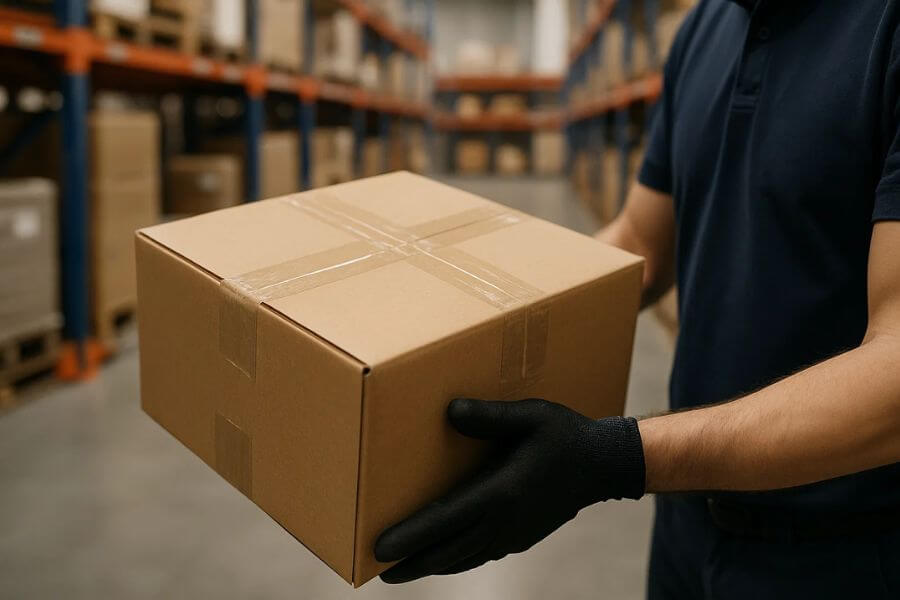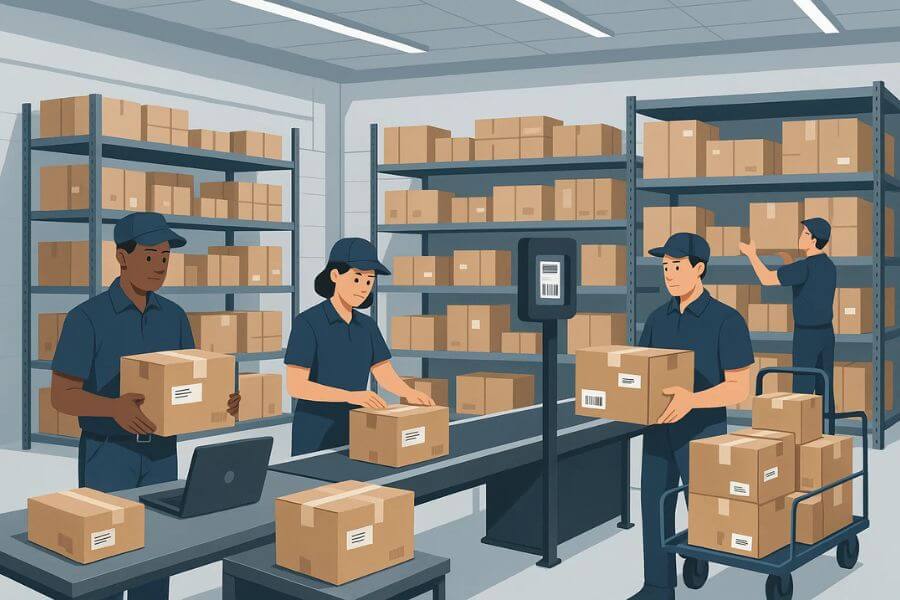E-commerce has undoubtedly revolutionized the way we shop, offering unparalleled convenience and a vast array of products at our fingertips. However, running a successful e-commerce business is no small feat, especially in 2023, where the landscape is more competitive and dynamic than ever before. One critical aspect of this challenge is e-commerce fulfillment. In this blog article, we’ll delve into the 10 most common e-commerce fulfillment challenges businesses are likely to face and explore strategies to overcome them.
1. Inventory Management
Inventory management is an ongoing puzzle for e-commerce businesses, and the year 2023 introduces its own set of complexities. The central challenge remains achieving that elusive equilibrium between having too much inventory and facing stockouts. Overstocking leads to increased holding costs and the risk of products becoming obsolete, while stockouts result in missed sales opportunities and customer dissatisfaction.
Solution:
In this rapidly evolving landscape, the key lies in harnessing AI-powered inventory management software. This technology offers real-time insights into inventory levels and market trends, allowing businesses to make informed decisions. By implementing advanced demand forecasting models that consider historical data, seasonality, and market dynamics, e-commerce businesses can fine-tune their inventory levels, reducing the likelihood of costly overstocking or stockout scenarios.
2. Shipping Costs and Efficiency
The relentless ascent of shipping costs poses an ongoing challenge for e-commerce businesses, and 2023 is no exception. The struggle to balance cost-effectiveness with efficient delivery remains ever-present. As shipping expenses continue to rise, businesses are faced with the pressing need to find innovative solutions.
Solution:
To address this challenge, e-commerce businesses should adopt a multifaceted approach. Negotiating bulk shipping discounts with carriers based on shipping volume can significantly reduce costs. Additionally, optimizing packaging to minimize dimensional weight ensures that shipping expenses are kept in check. Exploring streamlined shipping strategies, such as regional fulfillment centers, can further enhance efficiency while controlling costs. Moreover, embracing eco-friendly shipping practices not only aligns with sustainability expectations but also offers potential savings.
3. Order Accuracy
As e-commerce continues to evolve, the demand for precision in order accuracy remains unwavering. The challenge at hand is to minimize errors in picking, packing, and shipping, as any slip-up can lead to costly returns, diminished customer satisfaction, and harm to your brand’s reputation.
Solution:
Addressing this challenge requires a twofold approach. First, investments in advanced order fulfillment technology are paramount. Implementing cutting-edge systems and technologies can streamline the order processing workflow, reducing the chances of errors. Second, prioritizing comprehensive staff training is equally crucial. A well-trained workforce is better equipped to handle orders accurately, ensuring that the right products reach customers in pristine condition.
4. Peak Season Handling
Managing surges in demand during peak seasons presents a significant challenge for e-commerce businesses. The peaks and valleys of seasonal shopping trends put immense pressure on operations, requiring a well-thought-out strategy to meet customer expectations efficiently.
Solution:
To navigate this challenge successfully, proactive planning is essential. Businesses should prepare well in advance for peak seasons, anticipating increased demand and potential operational bottlenecks. Hiring temporary staff to cope with higher order volumes is a practical step. Additionally, exploring partnerships with third-party logistics (3PL) providers can offer scalability and the expertise needed to handle the seasonal surge.
5. Returns Management
Efficiently managing returns continues to be a significant challenge for e-commerce businesses in 2023. Handling the influx of returned items requires a streamlined process that both satisfies customers and minimizes the financial impact on the business.
Solution:
The solution begins with a clear and well-communicated return policy. Customers should have a transparent understanding of the returns process and guidelines. Streamlining the returns process itself, with efficient processing and clear communication, can help manage returns effectively. Additionally, exploring restocking options for returned items whenever possible can minimize losses.
6. Scalability
The challenge of scalability remains a constant concern for e-commerce businesses as they navigate the waves of growth and change in 2023. As businesses expand, ensuring that their operations can seamlessly adapt and grow with them becomes paramount.
Solution:
To address this challenge, businesses can embrace several strategies. Automation plays a significant role in streamlining operations and handling increased volumes efficiently. Cloud-based systems offer scalability by allowing easy adjustments to accommodate growth. Additionally, partnerships with 3PLs can provide the flexibility and expertise needed to scale operations rapidly when demand surges.
7. Customer Expectations
2023 brings with it a new level of elevated customer expectations in the e-commerce sphere. Customers now anticipate a seamless experience, including fast and free shipping, transparent order tracking, and a hassle-free returns process. Meeting these heightened demands is vital for retaining customer loyalty.
Solution:
Successfully navigating this challenge entails clear communication and a relentless focus on meeting, or even exceeding, customer expectations. Providing fast and reliable shipping options, along with real-time order tracking, helps ensure transparency and build trust. Additionally, streamlining the returns process and prioritizing excellent customer service can further enhance the overall shopping experience.
8. International Shipping and Regulations
In 2023, expanding into global markets presents e-commerce businesses with a unique set of challenges, particularly concerning international shipping. Navigating complex international shipping regulations, customs procedures, and tariffs requires a strategic approach.
Solution:
To tackle this challenge effectively, businesses should invest in gaining a comprehensive understanding of international shipping regulations. This knowledge is essential for compliance and ensuring smooth cross-border operations. Furthermore, partnering with experienced international logistics providers can provide valuable expertise and facilitate the seamless movement of goods across borders.
9. Inventory Forecasting
Accurate inventory forecasting remains a challenge in the ever-evolving landscape of e-commerce in 2023. Businesses must anticipate demand shifts, market trends, and consumer preferences with precision to avoid overstocking or stockout scenarios.
Solution:
To address this challenge, e-commerce businesses can leverage the power of data analytics, historical sales data, and AI-driven forecasting tools. By analyzing this data comprehensively, they can refine their inventory predictions. This allows for the maintenance of optimal stock levels, reducing excess inventory and minimizing the risk of running out of popular items.
10. Sustainability
Embracing sustainable practices is an increasingly important challenge for e-commerce businesses in 2023. Consumers are now prioritizing eco-conscious shopping, and businesses must align their operations accordingly.
Solution:
To tackle this challenge effectively, e-commerce companies can implement a range of sustainable practices. This includes adopting eco-friendly packaging materials, reducing waste through efficient processes, and minimizing the carbon footprint of their fulfillment operations. By embracing sustainability, businesses not only contribute to a greener planet but also enhance their brand image and meet the growing expectations of environmentally conscious consumers.
Conclusion
E-commerce fulfillment is a multifaceted challenge that requires adaptability, innovation, and a customer-centric approach. By addressing these 10 common challenges in 2023, e-commerce businesses can build efficient, cost-effective, and customer-friendly fulfillment processes that are vital for success in today’s competitive marketplace. Embrace technology, data-driven decision-making, and a commitment to meeting customer expectations to thrive in the e-commerce landscape of 2023 and beyond.





